Reading Michael Ignatieff's reflections on his fairly short, failed bid to become Canada's Prime Minister repeatedly led me back to two questions:
1) Why did he write this book?
2) Could he have been as naive or as idealistic as he seems to position himself in this book?
Fire and Ashes describes Ignatieff's conversion from ex-pat Canadian Harvard University professor with rather privileged roots (predecessors include an advisor to the Imperial Russian tsar, and Canadian academic George Grant [best known for writing Lament for a Nation]), to a rather out-of-place 'team manager' attempting to corral a national political party scarred by years of in-fighting, tilting towards declining support, and struggling to find a consistent, compelling identity into a lean, mean, effective political campaigning machine. It is also an assessment, if not some kind of apologia, of personal and professional failure.
Ignatieff, of course, finds a silk purse in this sow's ear. Whether for the sake of his ego, or better sales, I'm not sure. His ego seems intact. Book sales, not so much.
Underlying Ignatieff's narrative, reflections on flawed perceptions, mistakes made, and suggestions for improvement of Canada's political system, is a sense that that he made this strangely simplistic choice as much out of boredom, or the desire to face a good challenge unlike any he would face in a classroom, as he did from a burning desire to engage in public service, to change the country, or best an opponent. The gravity of his decision, and the ways he justifies his seems akin to the same sort of logic other people might apply to deciding to train to run a marathon, or learn a new language. I can't help but wonder what Ignatieff really, in his quietest moments, believed he was putting at stake.
Additionally, although he is sure to remind the reader that he was involved in Pierre Trudeau's 1968 election campaign, he had little other practical political experience. Yes, that's right, his most recent qualifications and training seem to have been thirty years previous. Since the 1960s, it seems he had not been involved in Canadian or American politics, other than as a commentator. How he could have expected to run a solid leadership campaign for 'the natural governing party' of Canada speaks both to his own powerful idealism and naiveté, as it perhaps does for the paucity of solid contenders vying for the quickly rusting crown of the Liberal party's leadership. Without meaning to insult Ignatieff, but if this clearly intelligent but nebbish expat constituted the Liberal Party's best threat to the Harper Conservatives, something was rotten in Gritsville.
.
John Gray offers a fair assessment in the Independent.

No comments:
Post a Comment